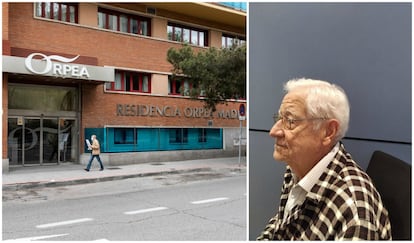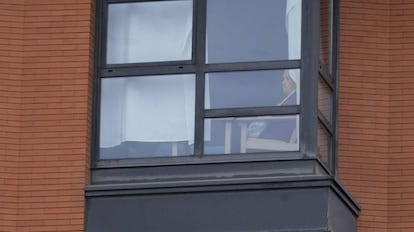Don Rafael: The Spanish 89-year-old who fled a coronavirus-stricken care home in fear for his life
The story of the senior illustrates that way that the pandemic is affecting such residences in Spain, at which high levels of fatalities are being registered


It was 8pm, which meant dinner time at the Madrid Loreto senior residence in the Spanish capital. An employee was placing the dishes on the table inside the suite of Don Rafael, where the 89-year-old resident had been confined since the beginning of the coronavirus pandemic.
Don Rafael noticed that the worker looked like he’d been crying.
“Have you seen any dead people?” he asked.
“Six, Don Rafael,” replied the employee.
“What are you talking about?”
“Hortensia, Conchita, Leopoldo...”
Don Rafael knew all these residents personally. It was at that point that the reality of what was happening outside his suite really dawned on him: besides the string of deaths, a lot of staff workers at the residence – one of many run by a company named Orpea – were on sick leave. The laundry room had not been operational for days, and nobody was going in to clean the rooms of residents showing symptoms of the coronavirus, out of fear of contagion.
Don Rafael picked up the phone and dialed his daughter’s number. He had to get out of there as soon as possible.
Rafael García, better known as Don Rafael to his acquaintances, was living in a suite with two rooms and a bathroom at Madrid Loreto. His wife had died six months earlier in Córdoba. and even though his children insisted on taking him in, he refused and chose instead to go live with other people his age. He didn’t want to be a burden.
I do not want to face the last moments of my life, if my time has come, in the way that many others haveRafael García
A jurist and criminologist by trade, for 43 years he served as a public employee at the Interior Ministry, and he valued his independence. The suite at the residence came with a price tag of €3,400 a month.
“I had to leave after finding out indirectly from an employee, to whom I swore secrecy, that my health and even my life were in danger,” he explained recently on the phone from his daughter’s house, where he is now living. Don Rafael walked out on March 20 with little more than the clothes on his back.
On March 8 Madrid’s regional authorities banned all visits at senior homes, and families have been complaining since then that it is very difficult to communicate with their loved ones. With staff members falling ill or quitting due to the coronavirus, care homes find themselves overwhelmed. Many of the elderly residents are themselves ill and have trouble communicating with the outside world.

But Don Rafael was in regular contact with his daughter. It had been his own decision to remain at the residence when the quarantine began, so as not to risk transmission to his own family members.
The first infection at the residence was detected in early March, and the man was hospitalized. Before the diagnosis, Don Rafael had shared a table with this patient during their daily mid-morning snack.
Locked up inside his suite after that, Don Rafael created a routine to fill the hours. He spent 30 minutes walking around in both rooms; he read online news; he played chess on his laptop; and he visited a site with a webcam offering views of Puerta del Sol, his favorite spot for a stroll.
“I am a person who has seen his share of tough situations, both personal ones and other people’s, but none of that helped me deal with what was taking place inside that residence,” he explained.
The news about the six deaths was only a preview of the real dimension of the internal crisis taking place at the care home, where 22 residents have died since the beginning of the pandemic.
Following media reports of more than 20 deaths at another Madrid residence, Monte Hermoso, Don Rafael’s daughter called the social worker and asked her up to three times whether any resident at Madrid Loreto had died of Covid-19. She said that the worker was adamant: “No, of course not!” Neither she nor her father believed her, and the next day Don Rafael’s daughter drove over to pick him up.
The news about the six deaths was only a preview of the real dimension of the internal crisis taking place at the care home
Ricardo Bucho, a spokesman for Orpea, said that following the media reports of deaths at Monte Hermoso, their own residence was flooded with calls from concerned relatives. Bucho said that only the first man, the one who used to eat his mid-morning snack with Don Rafael, was a confirmed case. After him, 11 other residents died with symptoms suggesting they also had the coronavirus, but no official confirmation exists because the bodies were not tested. As for the remaining fatalities, the spokesman said they are due to the fact that the residence takes in people in palliative care who are in the last stages of their lives. Bucho did not explain whether the rate of death was the same before and after the pandemic broke out.
The spokesman said that the residence has all the necessary protection measures in place, and noted that the facility is operating despite a 20% reduction in staff.
“Healthcare workers are heroes and people are acknowledging that with their applause every day at 8pm,” he said, alluding to a spontaneous movement by Spaniards in confinement due to the nationwide lockdown imposed on March 14. “But that tribute should also extend to the professionals working at residences who are putting themselves on the line to save other people.”
Don Rafael did not wish to risk ending up like some of his fellow residents. “Although I am close to 90, my legs are slow and I have serious underlying health conditions, my head is still working just fine, and I do not want to face the last moments of my life, if my time has come, in the way that many others have, out of neglect or negligence, in complete solitude,” he wrote in a message sent from his daughter’s computer.
Before walking out of the residence for good, Don Rafael said goodbye to the front desk worker, “a very nice girl.” He also ran into the residence director, and bid an elegant farewell: “God keep you all.”
Then he walked out the door. His time had not come yet.
English version by Susana Urra.
Tu suscripción se está usando en otro dispositivo
¿Quieres añadir otro usuario a tu suscripción?
Si continúas leyendo en este dispositivo, no se podrá leer en el otro.
FlechaTu suscripción se está usando en otro dispositivo y solo puedes acceder a EL PAÍS desde un dispositivo a la vez.
Si quieres compartir tu cuenta, cambia tu suscripción a la modalidad Premium, así podrás añadir otro usuario. Cada uno accederá con su propia cuenta de email, lo que os permitirá personalizar vuestra experiencia en EL PAÍS.
¿Tienes una suscripción de empresa? Accede aquí para contratar más cuentas.
En el caso de no saber quién está usando tu cuenta, te recomendamos cambiar tu contraseña aquí.
Si decides continuar compartiendo tu cuenta, este mensaje se mostrará en tu dispositivo y en el de la otra persona que está usando tu cuenta de forma indefinida, afectando a tu experiencia de lectura. Puedes consultar aquí los términos y condiciones de la suscripción digital.








































